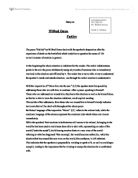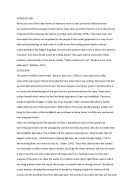Evolution of Man?
Robyn Good Good 1 Professor Hilderbrand Introduction to Poetry May 12, 2003 Assignment 2: appreciation Evolution of Man? In the poem "From Stone to Steel" Pratt begins with a cynical ironic stance and then at the last two lines of the poem ends with compassion and hope. Throughout the poem Pratt appears to be mocking man's brutality and questions whether man has really changed at all over the years. E.J Pratt was living in a time of change. He was amid the 1st world war and the second industrial revolution. This poem is during World War 1 and is about man and his evolution. The persona is a person who is older because s/he has experienced the world because s/he is knowledgeable. The persona is the voice that emits moral judgments by evolution and historical comparisons. Human history is intertwined into two things: the brutal immoral Neanderthal and the evolved humans who put on a façade of not being brutal and immoral. The entire first stanza makes the reader feel time lapse. The first line starts with a reference to evolution. When man was caveman he used to use stone, then he evolved to bronze and lastly moved on to steel. The persona is talking about Ancient to Modern times. This first line is a reference to historical development. The next two lines make Good 2 the reader feel the time duration. "Two revolutions of the wheel, from Java to
The poem "Futility" by Wilfred Owen deals with the speaker's desperation after the experience of death on the battlefield which leads him to question the sense of life as well as sense of creation in general.
Essay on Wilfred Owen, Futility The poem "Futility" by Wilfred Owen deals with the speaker's desperation after the experience of death on the battlefield which leads him to question the sense of life as well as sense of creation in general. At the beginning the whole situation is indistinct for the reader. The verbal indistinctness points to the role the poem attributes by using only words of someone who is immediately involved in the situation and afflicted by it. The reader has to try to infer, to try to understand the speaker's inside and outside situation, see through his verbal reaction to understand it. With the imperative of "Move him into the sun-" (I,1) the speaker starts his speech by addressing those who are with him, to continue -after a pause- speaking to himself. Those who are addressed are around him, they know the situation as well as he himself does, so that he is able to leave the situation indistinct, avoid explicit wording. This switch of the addressees, from those who are around him to himself already indicates two levels that will be dealt with throughout the whole poem: the factual language of the imperative "Move" (I,1) refers to the rational side, while the emotional language of the stanzas represent the emotional side which takes over almost immediately. While the speakers' first reactions in both stanzas still seems to be rational,
Dulce et Decorum Est by Wilfred Owen and Could You Not Write Otherwise? by Alan Paton.
INTRODUCTION Poems are one of the oldest forms of literature and it is one such form of literature that has evolved with the passage of time but has never been abundant. Poem is one of those forms of literature that surpasses the history of written texts (Horálek, 2019). It has been seen and discovered that poetry was employed by the people in the earlier generation as a way of oral history and genealogy as well as law. It is safe to say that writing poetry needs a strong understanding of the English language. However, the question that arises is what is the purpose of poetry? and what should a poet be writing about? This paper will try and answer these questions with the help of two poem namely, “Dulce et Decorum” and “Could you not write otherwise?” (Malaba, 2015). DISCUSSION The poem by Wilfred Owen titled “Dulce et Decorum” (1920) is a war poem and unlike many other war poems that came during the time when Owen was writing, this poem criticizes war and talks about the horror of war. The main purpose of writing a poem in the first place is to convey the innate feelings of the poet and this poem exactly does the same. Owen was a soldier himself which means he had first-hand experience of war and battlefield. The poem brings to light the struggle a soldier has to go through in their everyday life which is hardly talked about by any of the poets




